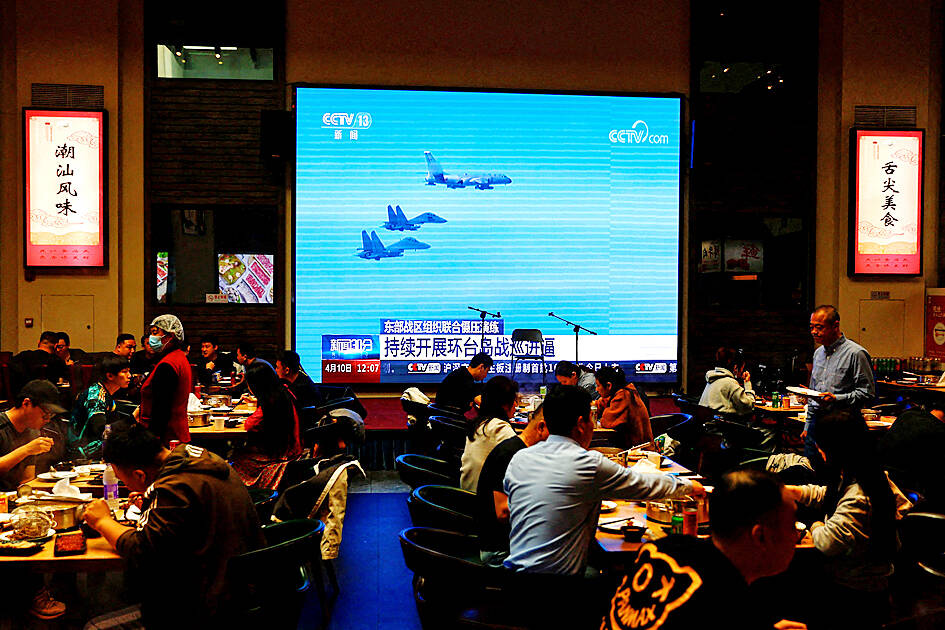A potential crisis across the Taiwan Strait on Thursday was rated as one of the top threats to US interests for the fourth consecutive year by the US Council on Foreign Relations.
The Center for Preventive Action published the results of the Preventive Priorities Survey, which compiled assessments by US foreign policy experts on the likelihood and effects of 30 potential conflicts that could emerge or escalate this year.
A “severe cross-strait crisis” that would affect the US and neighboring countries triggered by Beijing’s increasing economic and military pressure on Taiwan, especially around the nation’s presidential and legislative elections on Saturday next week, was one of the eight contingencies rated as “Tier I (High Priority)” in the report.

Photo: Reuters
The likelihood of such a crisis is “moderate,” but its effect on US interests would be “high,” the report said.
A high impact on US interests refers to a contingency that would directly threaten the US homeland, a defense treaty ally or a vital strategic interest, and “thus is likely to trigger a US military response,” it said.
The annual report rated possible conflicts between the US and China over Taiwan as a “Tier II (Medium Priority)” threat for its assessments in 2019 and 2020.
As tensions between Washington and Beijing intensified and the frequency of Chinese military activities near Taiwan increased, the situation was classified as a “Tier I” risk for the first time in 2021.
The growing risks of armed conflict with Russia and China are “by far the most worrisome” threats to the US, council director Paul Stares said.
“The trend toward less armed conflict around the world since the end of the Cold War is now moving in the opposite direction,” he said.
Three contingencies were rated as highly likely and having a high impact on US interests — “an unprecedented number” since the survey was launched in 2008, the report said.
Among the three, the possibility of growing political polarization leading to acts of domestic terrorism and political violence in the US was listed as the situation of most concern for the first time in 16 years, it said.
The other two were an expansion of the war between Hamas and Israel, and a surge of immigration to the US driven by criminal violence, corruption and economic hardship in Central America and Mexico, it said.
Other Tier I threats — which were all judged to be moderately likely and high-impact — were an escalation of the war in Ukraine, direct military confrontation between Iran and Israel, a highly disruptive cyberattack on critical infrastructure in the US and a security crisis in northeast Asia triggered by North Korea, it said.
The survey was conducted in November last year, receiving about 500 responses from US government officials, foreign policy experts and academics, it said.

ENDEAVOR MANTA: The ship is programmed to automatically return to its designated home port and would self-destruct if seized by another party The Endeavor Manta, Taiwan’s first military-specification uncrewed surface vehicle (USV) tailor-made to operate in the Taiwan Strait in a bid to bolster the nation’s asymmetric combat capabilities made its first appearance at Kaohsiung’s Singda Harbor yesterday. Taking inspiration from Ukraine’s navy, which is using USVs to force Russia’s Black Sea fleet to take shelter within its own ports, CSBC Taiwan (台灣國際造船) established a research and development unit on USVs last year, CSBC chairman Huang Cheng-hung (黃正弘) said. With the exception of the satellite guidance system and the outboard motors — which were purchased from foreign companies that were not affiliated with Chinese-funded

PERMIT REVOKED: The influencer at a news conference said the National Immigration Agency was infringing on human rights and persecuting Chinese spouses Chinese influencer “Yaya in Taiwan” (亞亞在台灣) yesterday evening voluntarily left Taiwan, despite saying yesterday morning that she had “no intention” of leaving after her residence permit was revoked over her comments on Taiwan being “unified” with China by military force. The Ministry of the Interior yesterday had said that it could forcibly deport the influencer at midnight, but was considering taking a more flexible approach and beginning procedures this morning. The influencer, whose given name is Liu Zhenya (劉振亞), departed on a 8:45pm flight from Taipei International Airport (Songshan airport) to Fuzhou, China. Liu held a news conference at the airport at 7pm,

AIR SUPPORT: The Ministry of National Defense thanked the US for the delivery, adding that it was an indicator of the White House’s commitment to the Taiwan Relations Act Deputy Minister of National Defense Po Horng-huei (柏鴻輝) and Representative to the US Alexander Yui on Friday attended a delivery ceremony for the first of Taiwan’s long-awaited 66 F-16C/D Block 70 jets at a Lockheed Martin Corp factory in Greenville, South Carolina. “We are so proud to be the global home of the F-16 and to support Taiwan’s air defense capabilities,” US Representative William Timmons wrote on X, alongside a photograph of Taiwanese and US officials at the event. The F-16C/D Block 70 jets Taiwan ordered have the same capabilities as aircraft that had been upgraded to F-16Vs. The batch of Lockheed Martin

GRIDLOCK: The National Fire Agency’s Special Search and Rescue team is on standby to travel to the countries to help out with the rescue effort A powerful earthquake rocked Myanmar and neighboring Thailand yesterday, killing at least three people in Bangkok and burying dozens when a high-rise building under construction collapsed. Footage shared on social media from Myanmar’s second-largest city showed widespread destruction, raising fears that many were trapped under the rubble or killed. The magnitude 7.7 earthquake, with an epicenter near Mandalay in Myanmar, struck at midday and was followed by a strong magnitude 6.4 aftershock. The extent of death, injury and destruction — especially in Myanmar, which is embroiled in a civil war and where information is tightly controlled at the best of times —